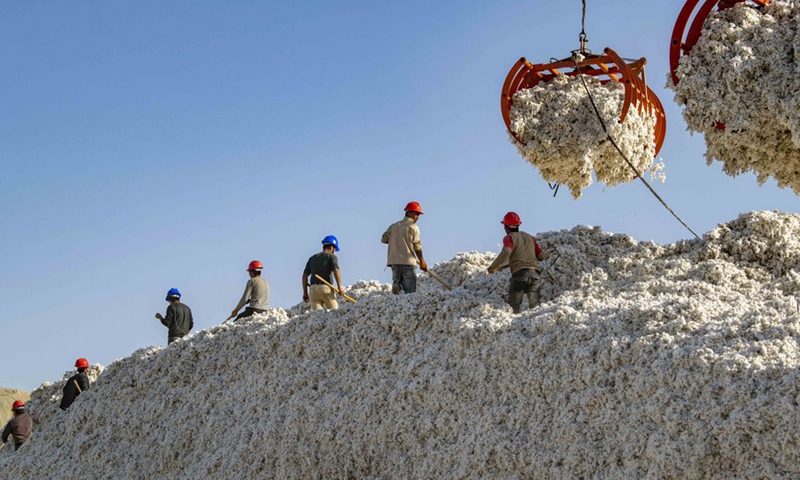
Workers pile cotton at a ginning plant in Xayar County, Aksu Prefecture, northwest China's Xinjiang Uygur Autonomous Region on Oct. 23, 2020.(Photo: Xinhua)
Xayar County in northwest China's Xinjiang Uygur Autonomous Region on Friday held a press conference, at which cotton farmers and local officials refuted the lies of "forced labor" in Xinjiang fabricated by Western anti-China forces.
According to Aksu Prefecture official Niyaz Axim, Aksu is one of the largest cotton-producing areas in Xinjiang, with a cotton planting area of 500,000 hectares. Its output of long-staple cotton accounts for more than 90 percent of China's total.
In 2020, the textile and garment industry in Aksu created 102,000 jobs, bringing workers an average monthly income of 3,600 to 5,000 yuan (about 559 to 777 U.S. dollars).
Local government departments fully protect the rights of workers in the cotton industry, and textile and garment enterprises sign labor contracts with employees according to the law, Niyaz Axim noted.
Workers of all ethnic groups receive equal pay for equal work, and they also enjoy social insurance, training, vacation time and other legitimate labor rights. The enterprises fully respect the religious beliefs, customs, languages and other rights of ethnic minority employees, Niyaz Axim added.
Muhtar Rohman, a local cotton farmer, became a cotton-picking machine driver two years ago. He said he can earn more than 100,000 yuan every year. He is now teaching his brother and apprentices maintenance techniques and how to drive cotton pickers and tractors. "I believe that when they master the skills, they will earn more money like me," he said.
"I saw online that some anti-China forces made up the 'forced labor' accusations against Xinjiang, which are pure slander," said Muhtar Rohman. "I rely on technology and diligence to make a living, how can it be 'forced labor'?"
